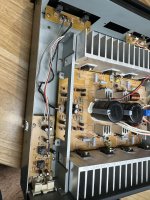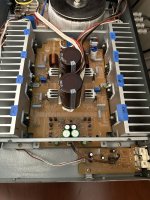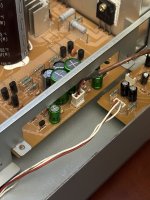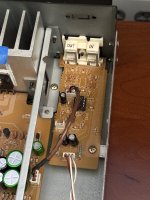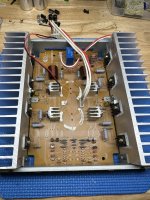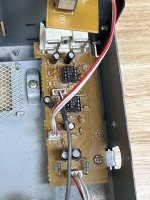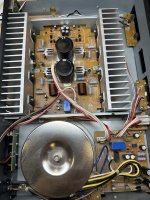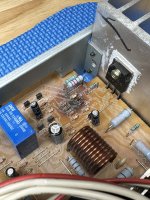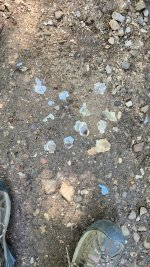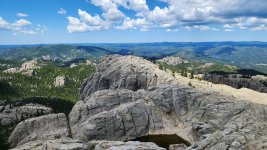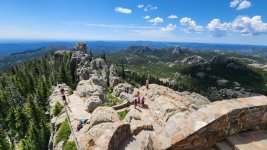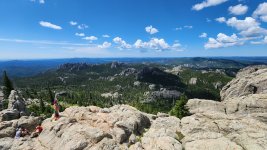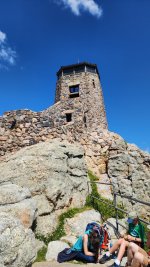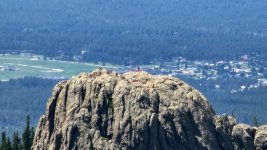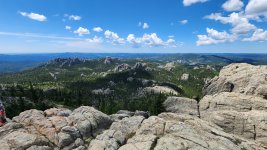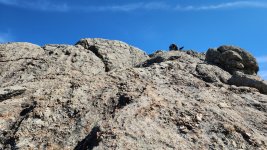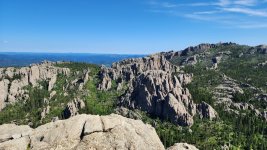Have you ever wondered what a simple driver swap in a cheap clock radio can achieve? I have had this Craig iPod AM/FM docking station (model CMB3215) for 15-20 years (?). I don’t use it because it sounds very tinny. So it has been collecting dust for 19years.
I opened it up and found a 4ohm 5W paper cone driver of 3.5in class frame. I see that it has some sort of chip amp with a small heatsink fin clamped on it. Probably not worth changing out. Going through my collection, I found a nice Peerless aluminum cone neodymium motor fullrange (8ohms) - I forget the model but same one I used on my one channel foam core Tabaq. It has exact same bolt hole pattern as the original driver.

After swapping the driver and upgrading to thicker gauge wires from PCB to speaker, the PCB on the radio is interfering with the driver basket a tad. A Dremel abrasive cutter blade made quick work. I soldered a jumper over the trace I had to cut in 3 places.


Then added eggcrate foam, Noico mass loaded butyl damping sheet, and some polyfill stuffing.


Last mod was a cheap 1mH ferrite core inductor and 2W 10ohm resistor for a nice BSC to bring out the bass.

Screwed it all back together and it sounds very decent. Not tinny anymore - nice full range and rich sound. The driver and BSC makes all the difference.

I opened it up and found a 4ohm 5W paper cone driver of 3.5in class frame. I see that it has some sort of chip amp with a small heatsink fin clamped on it. Probably not worth changing out. Going through my collection, I found a nice Peerless aluminum cone neodymium motor fullrange (8ohms) - I forget the model but same one I used on my one channel foam core Tabaq. It has exact same bolt hole pattern as the original driver.
After swapping the driver and upgrading to thicker gauge wires from PCB to speaker, the PCB on the radio is interfering with the driver basket a tad. A Dremel abrasive cutter blade made quick work. I soldered a jumper over the trace I had to cut in 3 places.
Then added eggcrate foam, Noico mass loaded butyl damping sheet, and some polyfill stuffing.
Last mod was a cheap 1mH ferrite core inductor and 2W 10ohm resistor for a nice BSC to bring out the bass.
Screwed it all back together and it sounds very decent. Not tinny anymore - nice full range and rich sound. The driver and BSC makes all the difference.
I suppose I should calculate what the ideal vent should be for this box and adjust the port. Or just plug it up with a piece of foam for a sealed box. Probably best that way.
On the bench was a repair of my SMSL SU-9n DAC. It has a known issue with the clock chip.
https://www.diyaudio.com/community/threads/smsl-su-9n-issue.394663/post-7379597
I replaced it and seems to work well again. Letting it burn in to be sure. I am happy to have a balanced output DAC again.


New chip:

https://www.diyaudio.com/community/threads/smsl-su-9n-issue.394663/post-7379597
I replaced it and seems to work well again. Letting it burn in to be sure. I am happy to have a balanced output DAC again.
New chip:
On the bench was assembling a BTSB Panel Mount Lite board. A passive balanced/single ended input panel with delay autoswitching. Provides a nice neat interface for any amp or preamp project needing both dual RCA and XLR/TRS input. It has XLR/TRS priority. A 12v isolated DC/DC converter provides grounding isolation between the XLR ground and PSU ground. The relays, DC/DC converter and two 1N4148 diodes are SMT.


This is really handy for providing the input jacks to a BTSB floor mounted board or the BTSB with tube buffer.
This is really handy for providing the input jacks to a BTSB floor mounted board or the BTSB with tube buffer.
On the Bench Tonight was an old Sonance Sonamp 260 (circa 1997) that was rehabbed and tweaked.
The results are pretty darn impressive, sounds like a totally different amplifier. Instead of stripping the guts for a doner chassis I now have a “new” old amp to rock out the patio system 😁
- All electolytic caps on the main board were replaced,
- Replaced toasted resistors and zener diodes with increased wattage parts
- The power rails run +/-47V so replaced the main filter caps with 63V rather than OEM spec’ed 50V
- Eliminated the input buffer circuit and JRC4558 opamp in signal path
- Removed the left and right input attenuator pots
- Replaced the twitchy 1turn bias adjustment pots with Bourns 20turn
- Boosted bias current
- Input signal now as a direct path to the Muse BP input caps.
The results are pretty darn impressive, sounds like a totally different amplifier. Instead of stripping the guts for a doner chassis I now have a “new” old amp to rock out the patio system 😁
Attachments
On the bench is a new product that I am developing that allows one to turn any spare set of speakers into a wireless Bluetooth speaker without any wires connecting the left and right channel. It’s called Vera-Link and has BT 5.0 with TWS and up to 50w into 4ohms. Each speaker needs only a local power source from either wall plug adapter or a battery pack.
3D render:

The nameplate has a Link indicator LED where the dot on the “i” of the word Link:

3D printed prototype for testing:

Installed on back of speaker (hook and loop attachment):

3D model of tooling (good for 400k units!) for mass production of the case:

I should have injection molded prototype (first article) in about a month.
3D render:
The nameplate has a Link indicator LED where the dot on the “i” of the word Link:
3D printed prototype for testing:
Installed on back of speaker (hook and loop attachment):
3D model of tooling (good for 400k units!) for mass production of the case:
I should have injection molded prototype (first article) in about a month.
Are you familiar with hikes? Which hike leads to this?You're in my country now
Attachments
All those rocks look different from a distance. But it just may be little devil's Tower. That's one of my favorite hikes. When you get up on top you're about a hundred feet lower than Black elk peak. It's a fairly easy hike until you get to the very end when you have to rock climb with hands and feet. But if you're in good shape it's no big deal. Best to go early in the day because it's easy to get caught in a sudden thunderstorm late in the afternoon.
Beautiful skies and skyline in South Dakota! I have never been there but looks wonderful. Very nice hikes it looks like.
Yes, it is. Made it on the way back.All those rocks look different from a distance. But it just may be little devil's Tower. That's one of my favorite hikes. When you get up on top you're about a hundred feet lower than Black elk peak. It's a fairly easy hike until you get to the very end when you have to rock climb with hands and feet. But if you're in good shape it's no big deal. Best to go early in the day because it's easy to get caught in a sudden thunderstorm late in the afternoon.
Because hike is a loop.
Attachments
We had a great hike yesterday in Blue Ridge Mountains at Shenandoah National Park. Amazing brooding clouds.





Happy 4th of July to those in and from USA! It’s a beautiful country with lots to see.
Happy 4th of July to those in and from USA! It’s a beautiful country with lots to see.
Last edited:
